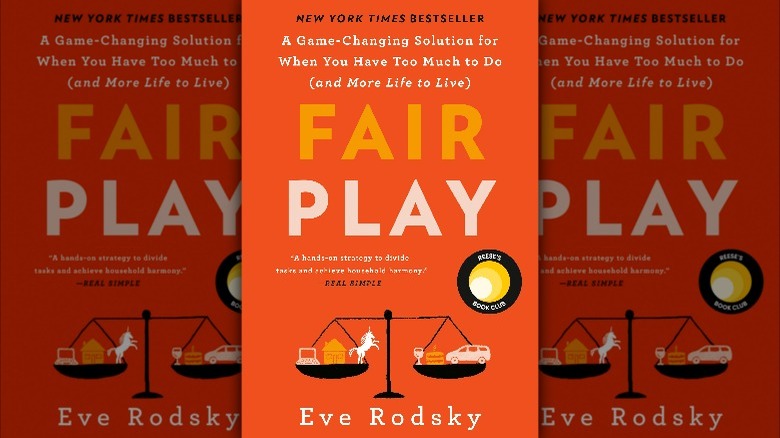The Fair Play Of Dividing Household Responsibilities Could Help Your Relationship
Every day, we all perform many tasks to make our homes run smoothly, and sometimes it can be a struggle to even keep your house clean. In addition, the way home-care jobs are divvied up can make or break a marriage. According to a 2019 Gallup poll, women are the ones who take on most of the labor, particularly cleaning, laundry, and childcare.
Then there's the mental load — the job of planning and thinking about these responsibilities. While this type of work is not as noticeable as a pile of clean, folded clothes, it takes up time and energy and is often delegated to women. Comic artist Emma characterizes the mental load as "always having to remember." When it comes to these managerial aspects of taking care of a home, she notes that "most of us feel resigned to the fact that we are alone in bearing the mental load, nibbling away at our work or leisure time."
However, author and lawyer Eve Rodsky believes there's a more equitable way. Rodsky interviewed more than 500 people in the United States to uncover how they divide up household tasks. Writing in Time, she says the conversations revealed a belief that "men's time is finite and women's time is infinite." In her book, "Fair Play: A Game-Changing Solution for When You Have Too Much to Do (and More Life to Live)," Rodsky challenges that paradigm. "Time is not money," she explained to Scary Mommy. "Time is time. My hour is equal to your hour." Here's how her method works.
Fair Play uses game cards to delegate home tasks equitably
The idea that "all time is created equal" is the first of four basic rules of Eve Rodsky's "Fair Play" system. The others involve thinking about hobbies and interests and cooperatively considering how partners can re-balance their responsibilities. In addition to her book, Rodsky crafted a card game to provide couples with a visual way to divide tasks more equitably. This deck of 100 cards includes items like laundry, cleaning, child care, meals, and home maintenance. To start, partners look through the choices and select the cards that pertain to their life circumstances. Next, each person selects cards for tasks where they'll assume responsibility.
Once a person holds a card, they are accountable for all aspects of the task, large or small, that come with the job, such as stocking detergent, washing, drying, folding, and putting away laundry. As participants delegate duties, Rodsky recommends they reach a consensus regarding a "minimum standard of care" to establish a baseline and ensure both are comfortable with how the job will be accomplished. She also encourages partners to exchange cards and responsibilities periodically so one person isn't stuck with the same tasks forever. At the end of the session, the goal is for everyone to feel they divided the work in a way they can agree upon, not necessarily split down the middle by the number of tasks. "What's fair is not always equal, and what's equal is not always fair," notes Rodsky.
Keep Fair Play working long term with these tips
Of course, "Fair Play" isn't an instant cure-all for household woes. It takes time and patience. For writer Sophie Caldecott, making the "Fair Play" system instinctive took her and her spouse about eight months. "The division of domestic labor is an incredibly emotionally loaded issue," Caldecott writes in The Everymom. To make the system work, she emphasizes both people need to keep communicating "until the tension turns and the solution flows and things become easier again."
Watching the "Fair Play" documentary prompted writer Alexandra Frost to converse with her partner about their division of household labor. "The awareness is the most important learning we'll take from 'Fair Play,' along with the mutual respect for the other's career, even amidst hiccups that disrupt it," she explained to Scary Mommy. Now the couple checks in with each other when unexpected childcare situations arise, rather than having one parent always rearranging their work schedule.
According to Eve Rodsky, this awareness and ongoing check-ins are an important part of maintaining "Fair Play." She suggests a designated daily or weekly time for partners to give feedback, share successes, and search for solutions. When offering commentary, Rodsky recommends keeping the conversation "I" centered. Recalling her own experiences, "It hasn't always been easy; a shift in thinking takes deliberate effort," she admits in Time. "I'd attempt to reframe the conversation with words that honor and respect how we each choose to spend our finite time."
Get your kids involved with household responsibilities
Running a household is a team effort. If you have kids, it means more responsibilities, particularly when caring for a baby or young child. However, as children grow, it also opens up opportunities for further dividing home and care tasks. Kids can help with packing lunches at night and a quick evening tidying-up session to make everyone's morning easier. They can also assume responsibility for items pertaining to their own room or extracurricular activities, or work side-by-side on a task with a parent. "It stretches them, gives them important roles in the household, and improves their own executive function skills," Mariel Benjamin, a licensed clinical social worker, told blogger Camille Styles. "Above all, remember that asking for help and dividing responsibility is never a bad choice, as long as we allow ourselves to believe that we are entitled to it."
One of the keys to getting kids involved is starting early with age-appropriate tasks. Young children love to participate in what their parents are doing, and over time, they'll observe and practice how a chore is done. "Early opportunities to collaborate with parents likely sets off a developmental trajectory that leads to children voluntarily helping and pitching in at home," Andrew Coppens, professor and researcher in education at the University of New Hampshire, explained to NPR. And just like with the "Fair Play" cards, offering to exchange jobs periodically with kids can make chores less of a grind.



